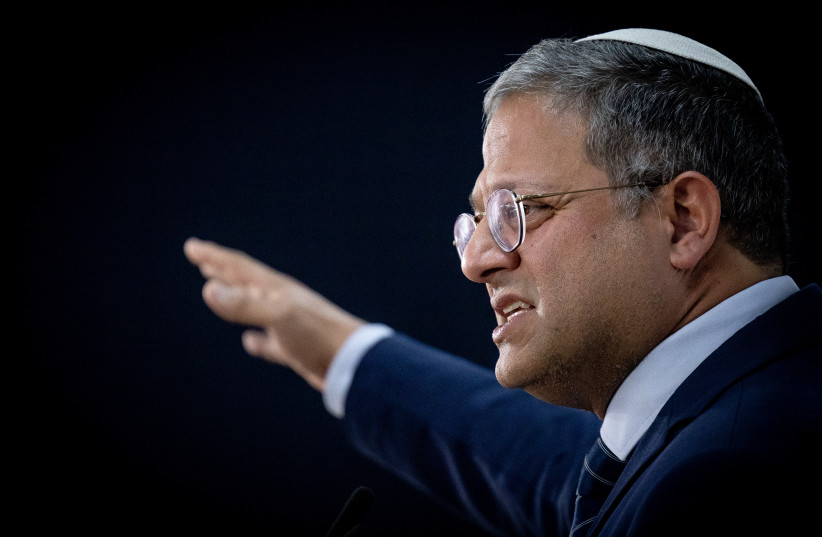National Security Minister Itamar Ben-Gvir was barred from giving orders for ongoing in-field police operations, the High Court of Justice ruled in an interim order, which came after the Attorney-General had expressed concerns about his interference in law enforcement engagement with judicial reform protests.
The court determined that in previous discussions between the Attorney-General and Ben-Gvir, he had agreed that police commanders would handle field decisions. While there was agreement that Ben-Gvir would make general policies and principles for the police, including regarding demonstrations, ongoing operations were beyond the scope of policy and were in the province of field commanders.
"The minister is not allowed to give operational instructions regarding the implementation of policy, the manner in which force is used, the means of dispersing demonstrations, and conditions regarding the time, place and manner of the event," ruled Justice Isaac Amit. "These matters and details are subject to the professional-operative discretion of the professional ranks of the police and the commanders in the field."
Ben-Gvir's accusations
Ben-Gvir attacked Amit for the decision, which he said prevented him from addressing "anarchist riots and blockading of roads." He accussed Amit of abolishing executive authority, usurping his authority and acting on a conflict of interest on the judicial reform.
"This decision only strengthens the vital urgency of the judicial reform," said Ben-Gvir. "In the amendment to the police order passed by the Knesset upon the establishment of the government, it was determined that the police would be subordinate to the government and the national security minister."

The Police Law, the first section of which passed on December 28, is currently being appealed by several political actors.
Ben-Gvir said that it was made clear that this amendment was not enough, and that a further amendment would have to be implemented so that his policy would be enforced in the field. This sentiment was echoed by fellow Otzma member, Heritage Minister Amichai Eliyahu.
New Hope leader Gideon Sa'ar welcomed the decision by the High Court, saying that it ruled what everyone new, Ben-Gvir was not the Police high commissioner.
"The core of the government's moves is an attempt to take over the country's law enforcement systems," said Sa'ar, listing the courts, legal advisers and the police. "This is an illegitimate takeover attempt, crossing a red line that must not be allowed, because after it Israel will be a different state."
Labor leader Merav Michaeli said that the court had done a good job of preventing the use of police against protesters.
The Movement for Quality Government in Israel said that Ben-Gvir was continuing to create chaos with the police.
"His stated purpose is not to preserve Israeli society, but to incite chaos and anarchy in the streets," said the Movement.
The ruling came after the Attorney-General's office raised concerns that Ben-Gvir had interfered in police in an illegal manner. The interference included contacting officers and issuing directives, such as a March 1 order to open roadblocks. On March 9, Ben-Gvir had decided to remove Tel Aviv Police Chief Ami Eshed from his position. The national security minister had criticized Eshed's approach to the judicial reform protests
Ben-Gvir has returned that these were policy decisions, though the Attorney-General argued that they were direct orders under the guise of policy decisions.
This is a developing story.
